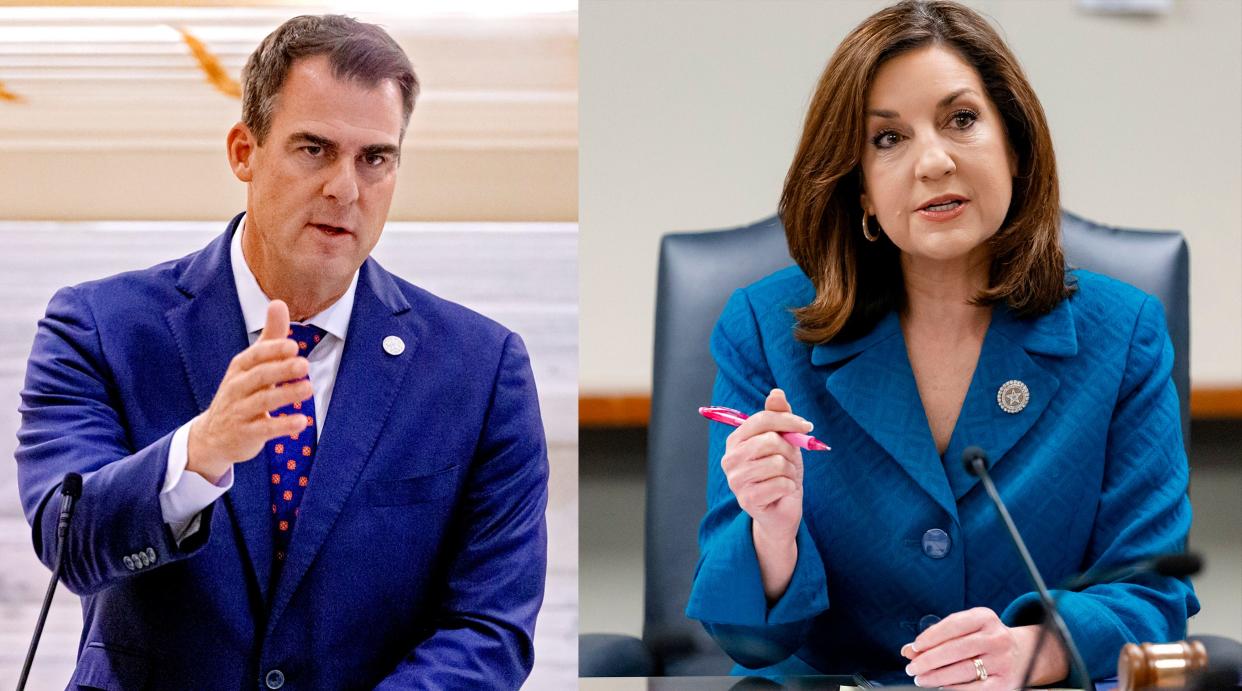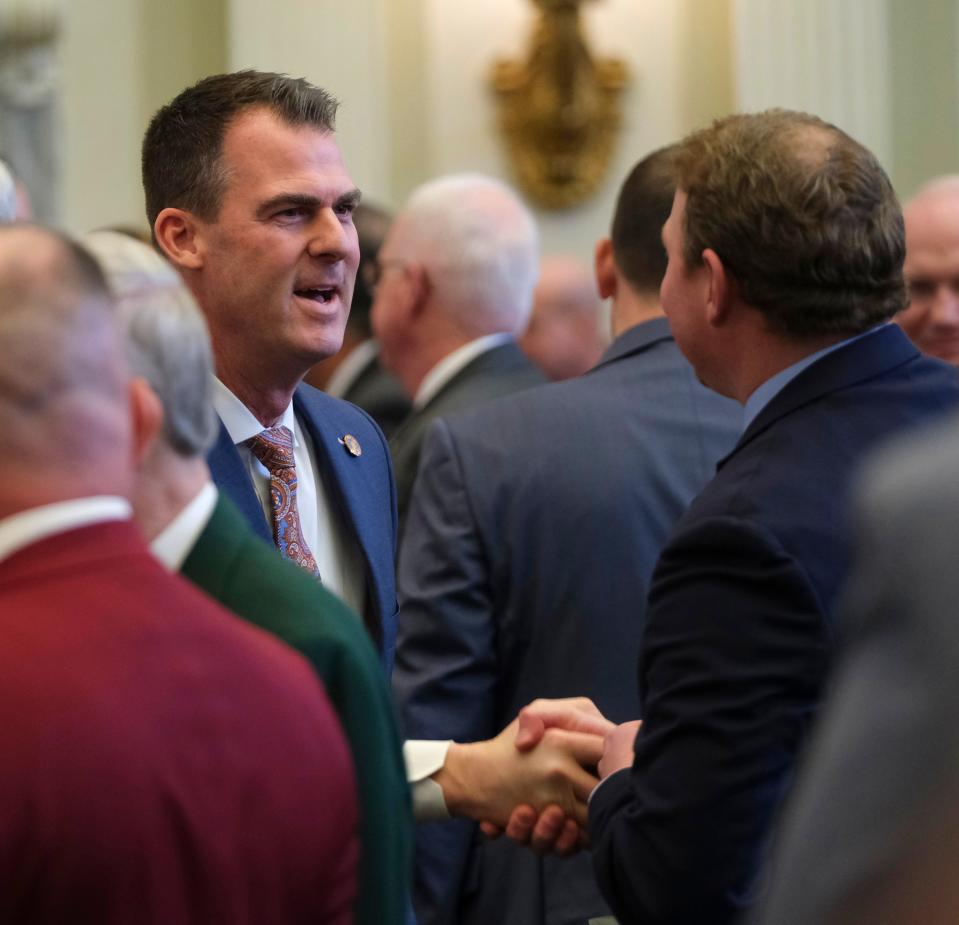Joy Hofmeister, seizing on voucher plan, says Kevin Stitt would ‘kill’ rural schools

- Oops!Something went wrong.Please try again later.
- Oops!Something went wrong.Please try again later.
CHECOTAH — Speaking to a crowd gathered inside a downtown coffee shop, many dressed in Wildcat blue ahead of a Friday night football game, Joy Hofmeister warned that Gov. Kevin Stitt’s reelection would put the local school system — the heart of this small town — in jeopardy.
“Stitt’s voucher scheme is a rural school killer,” said Hofmeister, using a line she has repeated many times on the campaign trail, this time in Checotah, a city of 3,300 in eastern Oklahoma.
In her race for governor, Hofmeister, the Democratic candidate, has brought her anti-voucher message to small communities across rural Oklahoma, an effort to attack one of Stitt’s core policy objectives and win votes in what are currently Republican strongholds.
Vouchers, also referred to as education savings accounts, allow families to use the tax dollars allocated for them at their local public school for another form of education, including private school tuition.
“People realize that this is not going to address the needs of schools, especially these schools,” Hofmeister told The Oklahoman, referring to rural districts.
In a race that some polls show tightening, Hofmeister, the state’s top school official for the past eight years, views education as a winning message in a state where a decade of teacher shortages, program cuts and lagging academic metrics have many voters dissatisfied with the state’s public school system.
More:Poll shows 1-point lead for Stitt over Hofmeister in governor's race
However, Stitt faced a challenger with a similar message four years ago, beating Democrat Drew Edmondson, who ran largely on a promise to increase education funding.
Stitt also has blamed Hofmeister for not moving the needle for Oklahoma schools despite overseeing the Oklahoma State Department of Education for two terms.
But private school vouchers represent a significant divide between the two candidates and a policy issue that many in rural Oklahoma are paying close attention to, said Ed Cannaday, a former state representative from eastern Oklahoma who supports Hofmeister.
“I know there are more issues out there than education, but it really is top of mind for many folks around here,” said Cannaday, a Democrat who served in the state Legislature for 12 years, including on the House education committee.
“I think people who work in education ... or have a connection to their local school feel like she speaks on their behalf, and that isn’t a feeling that has always been there with other candidates.”
Stitt made vouchers one of his top policy goals this year

Stitt was opposed to vouchers when he ran for office four years ago. But it became one of his highest policy objectives this past year. It’s an issue he continues to promote and often brings up when speaking to voters or at various events.
“Every child and their family should be free to choose where and how their child is educated,” said Stitt, speaking at an evangelical conference in Atlanta last week. “We want to give education freedom back to parents, put parents back in charge of their kid’s education.”
In promoting school choice, Stitt has given examples of students stuck in low-performing schools, unable to move because they can’t afford it. He also has claimed teachers are pushing “liberal ideology,” which is another reason parents need help fleeing some public schools.
“In Oklahoma ... a parent came forward because a teacher was giving a barcode to their students, elementary school students, where they could click it and there was pornography,” Stitt said. “We had to get rid of that teacher.”
More:This Oklahoma teacher helped students get banned books. An official wants her license revoked
Stitt was referring to a former teacher from Norman High School, not an elementary school, who was not fired but resigned. The barcode she gave students allowed them to access a collection of books that have sometimes been banned by schools across the country, many that cover topics of race, diversity and LGBTQ communities.
“That's why we are for school choice and parent choice,” Stitt said, referring to the Norman High School story.
Stitt pushed for a school voucher bill this past legislative session, but the effort stalled with a narrow defeat in the state Senate and a vow from state House leaders that it was dead on arrival.
Many of the Legislature’s rural members said they opposed private school vouchers because it would not benefit small towns where there is a lack of education options.
More:Defeat of school voucher bill sets up campaign debates in governor, superintendent races
Sen. Zack Taylor, a Republican who represents a rural district in central Oklahoma, acknowledged that private school vouchers might not seem relevant to many rural voters, but if passed, he believes more options could follow.
“There aren't options (in rural Oklahoma) because there isn't a pathway for many of the people in rural Oklahoma to afford it,” Taylor said, referring to private schools. “But if you provide a pathway to afford it, the free market may decide to create more options.”
While Taylor said he didn't believe the voucher issue would cost the governor votes, he predicted that a Stitt reelection could give the issue momentum heading into next year.
“I do think that if (Stitt) were reelected by a good margin that would kind of tell you that Oklahomans, by and large, agree with many of his policies, including school choice,” Taylor said.
Stitt's education secretary, a candidate for state superintendent, also promotes the use of vouchers

School choice also has become a central theme in the race for state superintendent, as Stitt’s education secretary, Ryan Walters, is a strong proponent of funneling more state funds to private schools and alternative education programs.
“This election showed the voters support school choice,” Walters told The Oklahoman last month after he won a Republican primary election.
Democrat Jena Nelson, who is also running for state superintendent, opposes vouchers, and her supporters have pointed to a poll that shows her support in rural Oklahoma as a sign voters there are opposed to school choice policies.
More:Superintendent election a 'battle' for future of Oklahoma public education
Both the superintendent and governor elections will be on Nov. 8.
During Hofmeister’s campaign stop last week in Checotah, many in the crowd were educators who opposed school choice policies and wanted to see the state focus more on increasing public school funding and support for teachers.
“I have to beg people to come work for me, even two days before school starts,” said Cindy Frame, the principal at Checotah Elementary. “I don't think people understand the seriousness of not being able to find teachers. But I can’t take four more years of this.”
This article originally appeared on Oklahoman: School vouchers a defining issue in Oklahoma governor's race

